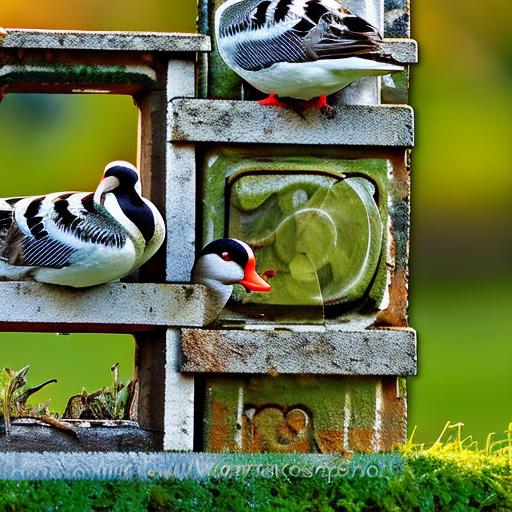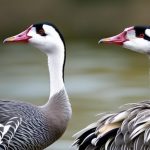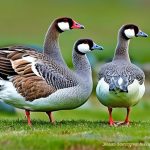Geese invading gardens and yards can be a frustrating problem for many homeowners. These large birds can cause damage to plants, leave behind droppings, and create a mess in outdoor spaces. Fortunately, there are several strategies that can be used to keep geese away and maintain a goose-free garden.
One of the most effective ways to deter geese is by understanding their behavior and what attracts them to gardens and yards. By knowing their habits and tendencies, homeowners can implement strategies that will discourage geese from entering their outdoor spaces.
Key Takeaways
- Understanding the behavior of yard geese is crucial for effective deterrence.
- Physical barriers such as fences and netting can keep geese out of the garden.
- Decoys and scare tactics like noise makers can be effective in deterring geese.
- Motion-activated sprinklers can startle geese and keep them away from the garden.
- Planting vegetation that geese dislike, such as prickly or thorny plants, can discourage them from entering the garden.
Understanding the behavior of yard geese
Geese are social animals that often travel in flocks. They are attracted to open spaces with easy access to food and water sources. Gardens and yards provide an ideal environment for geese, as they offer plenty of grass to graze on and often have ponds or water features nearby.
Geese are also known for their territorial behavior, especially during nesting season. They will defend their nesting sites aggressively, which can lead to confrontations with humans or other animals. This territorial behavior can make it difficult to deter geese once they have established a presence in a garden or yard.
Creating physical barriers to keep geese out of the garden
One effective strategy for keeping geese out of the garden is by creating physical barriers. There are several types of barriers that can be used, including fences, netting, and hedges.
Fences can be an effective way to keep geese out of the garden, especially if they are tall enough to prevent the birds from flying over them. It is important to ensure that the fence is secure and does not have any gaps or openings that geese can squeeze through.
Netting can also be used to create a barrier around the garden. This can be particularly useful for protecting specific areas or individual plants from geese. However, it is important to regularly check the netting for any damage or holes that geese could exploit.
Hedges can serve as a natural barrier to keep geese out of the garden. Dense, thorny hedges can be effective at deterring geese, as they provide an obstacle that the birds are unlikely to try and navigate through.
Using decoys and scare tactics to deter geese
Decoys and scare tactics can be effective at deterring geese from entering gardens and yards. These methods rely on the birds’ natural instincts and fear of predators.
Decoys, such as plastic owls or coyotes, can be placed in the garden to create the illusion of a predator presence. Geese are naturally wary of predators and will often avoid areas where they believe there is a threat. It is important to regularly move the decoys around to prevent geese from becoming accustomed to their presence.
Scare tactics, such as noise makers or reflective objects, can also be used to deter geese. These tactics work by startling the birds and making them feel uncomfortable in the area. Noise makers can include wind chimes, bells, or even a radio set to a talk station. Reflective objects, such as shiny tape or aluminum foil strips, can be hung around the garden to create flashes of light that will startle geese.
Installing motion-activated sprinklers to keep geese away
Motion-activated sprinklers can be an effective way to keep geese away from gardens and yards. These sprinklers work by detecting movement and then spraying a burst of water in the direction of the movement.
When geese approach the garden, the motion-activated sprinklers will detect their movement and activate, spraying water in their direction. This sudden burst of water will startle the geese and discourage them from entering the area.
It is important to install motion-activated sprinklers strategically around the garden to ensure maximum coverage. They should be placed in areas where geese are likely to enter, such as near ponds or water features. Regular maintenance is also necessary to ensure that the sprinklers are functioning properly and not blocked by vegetation.
Planting vegetation that geese dislike

Another strategy for keeping geese away from gardens is by planting vegetation that they dislike. There are certain types of plants that geese find unappealing and will avoid.
Tall grasses, such as switchgrass or fountain grass, can be effective at deterring geese. These grasses have sharp edges and can be uncomfortable for geese to walk through or graze on. Additionally, they provide cover for smaller animals that may prey on geese, further discouraging their presence.
Plants with strong scents, such as lavender or rosemary, can also deter geese. The strong smells can be overwhelming for the birds and make them less likely to enter the garden.
It is important to regularly maintain the vegetation in the garden to ensure its effectiveness at deterring geese. Trimming and pruning should be done regularly to prevent overgrowth and maintain the desired shape and size of the plants.
Removing sources of food and water from the garden
Geese are attracted to gardens and yards that provide easy access to food and water sources. By removing these sources, homeowners can discourage geese from entering their outdoor spaces.
One way to remove food sources is by ensuring that any fallen fruit or seeds are promptly cleaned up. Geese are attracted to these food sources and will often return to areas where they have found an easy meal.
Water features, such as ponds or birdbaths, can also attract geese. By removing or covering these water sources, homeowners can make their gardens less appealing to geese.
Regular maintenance is necessary to ensure that food and water sources are not present in the garden. This includes cleaning up any fallen fruit or seeds, as well as regularly checking and cleaning water features.
Using repellents and deterrents to keep geese at bay
There are several types of repellents and deterrents that can be used to keep geese away from gardens and yards. These products work by creating an unpleasant or uncomfortable environment for the birds.
Chemical repellents, such as goose repellent sprays, can be applied to areas where geese are likely to enter. These sprays emit a scent that is unappealing to geese and will deter them from entering the area.
Visual deterrents, such as scare-eye balloons or reflective tape, can also be effective at deterring geese. These deterrents create movement or flashes of light that will startle the birds and make them feel uncomfortable.
It is important to regularly reapply repellents and maintain visual deterrents to ensure their effectiveness. Weather conditions and natural wear can reduce the effectiveness of these products over time.
Creating alternative areas for geese to roam and graze
Creating alternative areas for geese to roam and graze can be an effective way to keep them away from gardens and yards. By providing an alternative space, homeowners can encourage geese to stay away from their outdoor spaces.
One option is to create a designated grazing area for geese. This can be done by planting a specific area with grasses or other vegetation that geese find appealing. By providing an alternative food source, homeowners can encourage geese to stay in this designated area rather than venturing into the garden.
Another option is to create a pond or water feature specifically for geese. By providing a water source in a separate area, homeowners can attract geese away from their gardens and yards.
Regular maintenance is necessary to ensure that the alternative areas are well-maintained and continue to attract geese. This includes regular mowing or trimming of the grazing area, as well as regular cleaning and maintenance of the water feature.
Encouraging natural predators to keep geese away
One natural way to keep geese away from gardens and yards is by encouraging natural predators to visit the area. There are several types of predators that can help deter geese, including dogs, foxes, and hawks.
Dogs can be effective at deterring geese, as their presence alone can be enough to scare the birds away. Foxes are natural predators of geese and their presence can help keep geese away from gardens and yards. Hawks are also natural predators of geese and their presence can deter the birds from entering an area.
To encourage natural predators, homeowners can create habitats that are attractive to these animals. This can include providing shelter, such as nesting boxes or dens, as well as food sources that attract these predators.
It is important to note that encouraging natural predators may not be suitable for all areas or situations. Homeowners should consider the potential risks and benefits before implementing this strategy.
Consistently monitoring and adjusting strategies to maintain a goose-free garden
Keeping a goose-free garden requires consistent monitoring and adjustment of strategies. Geese are intelligent animals and may adapt to certain deterrents over time.
Regularly inspecting the garden for signs of geese, such as droppings or damage to plants, is important for early detection. If geese are spotted in the garden, it may be necessary to adjust or reinforce existing strategies.
It is also important to stay vigilant and make necessary adjustments as needed. This may include trying different deterrents or combining multiple strategies for maximum effectiveness.
In conclusion, there are several strategies that can be used to keep geese away from gardens and yards. These strategies include creating physical barriers, using decoys and scare tactics, installing motion-activated sprinklers, planting vegetation that geese dislike, removing sources of food and water, using repellents and deterrents, creating alternative areas for geese, encouraging natural predators, and consistently monitoring and adjusting strategies.
It is important for homeowners to try different strategies and find what works best for their garden. By implementing these strategies and staying vigilant, homeowners can maintain a goose-free garden and enjoy their outdoor spaces without the hassle of geese invading.
If you’re struggling to keep yard geese out of your garden, you may find this article on how to build a Hannah Montana chicken coop helpful. While the article focuses on creating a safe and comfortable space for chickens, many of the tips and techniques can also be applied to keeping geese away from your garden. From secure fencing to strategic placement of plants, this article offers practical solutions to protect your garden from unwanted feathered visitors.
FAQs
What are yard geese?
Yard geese are domesticated geese that are kept in a yard or garden for various reasons, such as as pets, for meat or egg production, or for ornamental purposes.
Why do yard geese enter gardens?
Yard geese may enter gardens in search of food, water, or shelter. They may also be attracted to certain plants or vegetables in the garden.
What are the problems caused by yard geese in gardens?
Yard geese can cause damage to plants, vegetables, and garden structures. They can also leave droppings that can be unsightly and unsanitary.
How can I keep yard geese out of my garden?
There are several ways to keep yard geese out of your garden, such as using physical barriers like fences or netting, using repellents like decoys or noise makers, or planting certain plants that geese dislike.
Are there any humane ways to keep yard geese out of my garden?
Yes, there are several humane ways to keep yard geese out of your garden, such as using visual deterrents like scarecrows or reflective tape, or using natural repellents like garlic or hot pepper spray.
What should I do if yard geese continue to enter my garden?
If yard geese continue to enter your garden despite your efforts to keep them out, you may need to seek the help of a professional wildlife control service.
Meet Walter, the feathered-friend fanatic of Florida! Nestled in the sunshine state, Walter struts through life with his feathered companions, clucking his way to happiness. With a coop that’s fancier than a five-star hotel, he’s the Don Juan of the chicken world. When he’s not teaching his hens to do the cha-cha, you’ll find him in a heated debate with his prized rooster, Sir Clucks-a-Lot. Walter’s poultry passion is no yolk; he’s the sunny-side-up guy you never knew you needed in your flock of friends!







